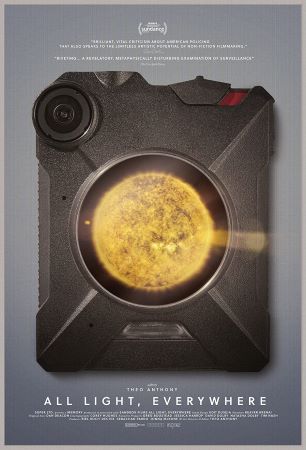
All Light, Everywhere 2021
Distributed by Collective Eye Films, 1315 SE 20th Ave. #3, Portland OR 97214; 971-236-2056
Produced by Jonna McKone, Sebastian Pardo, and Riel Roch Decter
Directed by Theo Anthony
Streaming, 109 mins
Middle School - General Adult
Documentaries; Law; Philosophy; Sociology
Date Entered: 12/13/2022
Reviewed by Jennifer Dean, Film Editor, Filmmaker, Film CuratorSurveillance as a form of societal control is nothing new - even before cameras were ubiquitous surveillance provided a form of control and power over the general populace. Back in the days of Greek mythology there was Argus Panoptes, the giant with a hundred eyes, and in the 19th century, as film scholar Tom Gunning (among others) points out, photography gave rise to the mugshot and a new way of processing criminals. Using traditional documentary tropes of interviews, vérité footage interspersed with poetic imagery and a hypnotic score, All Light, Everywhere tackles the 21st century developments in monitoring society for the purposes of control and managing perceptions.
The documentary opens on a close up examining the human eye using only diegetic sounds without any score and with subtitles explaining the mechanics of vision, a very quiet written discourse on the physiological reality of sight. Then filmmaker Theo Anthony segues into giving voice to the cinematic interpretation with narrator Keaver Brenai, who produces a calming synthetic quality in her reading of the material. This dialectical discourse between the factual representation of the written word and the insights of the voice actor’s interpretation of these facts (often through the lens of history) creates a compelling analysis on surveillance and its effect on society and perception: the way we live and the way we see.
On a tour of Axon headquarters (a company that makes TASER weapons, police body cameras and cloud software for law enforcement), CEO Steve Tuttle introduces the “Black Box” a research room in the middle of their office space. The box is a large room hidden from the public with tinted windows which allow researchers to see out to the cubicles and the office workers beyond the box while protecting them from view, a modern version of Jeremy Bentham’s panopticon where a prison is constructed in such a manner as to allow one security guard to view all prisoners. In Axon’s Black Box the security guard (in this case research and development teams) can observe the world without being subjected to a return gaze. Tuttle takes pride in this power dynamic and seems oblivious to the disturbing Foucauldian implications. As Foucault remarked, “what is so astonishing about the fact that our prisons resemble our factories, schools, military bases, and hospitals - all of which in turn resemble prisons.”
The lens through which we capture reality is dissected throughout the course of the film. An ominous score, scenes of the filming of individuals in a focus group watching footage and stories of the history of technology moving from scientific discovery to military and law enforcement use contextualizes the interviews, as it does the observational footage of a police training on the use of body cameras, a community meeting promoting surveillance technology to deter crime and a tour of the Axon facilities. Those who promote surveillance as objective evidence thus are faced with the same problem that they engender with their capture of images. The audience sees something that is not necessarily what they intended to communicate. The editor and camera, outside of frame have modified the point of view.
The film is superbly structured - with a coda at the end of the Baltimore high school students filmmaker Anthony initially embarked on documenting. This epilogue initially feels a bit out of place but serves to further illustrate the relationship of camera and subject. As the narrator elucidates at one point, “Where seeing meets the seeing of the world, we are blind.” The viewer does not know what is not presented to them even if it is captured on film - and of course, as is so clearly demonstrated in the film itself, we do not know what has happened outside of the scope of view. The police body camera does not capture the police officer, only what is in front of the officer, what is in view of the camera. In this scenario the police officer is the filmmaker and is able to construct a narrative using the footage they have caught on camera.
All Light, Everywhere is highly recommended to accompany courses on criminal justice, law enforcement, philosophy, cinema and documentary or for any class addressing the impact of technology on society.
Awards: Champs-Élysées Film Festival 2021 - Nominee Longs métrages américains Theo Anthony - Prix du jury, Cinema Eye Honors Awards, US 2022, Outstanding Achievement in Original Music Score - Dan Deacon, Outstanding Achievement in Cinematogrpahy Corey Hughes, Outstanding Achievement in Sound Design Udit Duseja, CPH:DOX 2021 Honorable Mention, F:ACT Award, DocAviv Film Festival 2021, Depth of Field Competition, DocumentaMadrid 2021 Best International Film Jury Prize, Dokufest International Documentary and Short Film Festival 2021, International Dox Award Nominee, Guanajuato International Film Festival 2021 Best International Documentary Feature Nominee, Indiewire Critic’s Poll 2021 Best Documentary Nominee, Jeonju Film Festival 2021 International Competition, Mar del Plata Film Festival 2021, Sundance Film Festival 2021, US Documentary Special Jury Award, Thessaloniki Documentary Film Festival 2021, Tirana International Film Festival 2021, Torino Film Festival 2021 - Best International Documentary Film, Zurich Film Festival 2021 Science Film Award.
Published and licensed under the Creative Commons Attribution 4.0 license. Anyone can use these reviews, so long as they comply with the terms of the license.